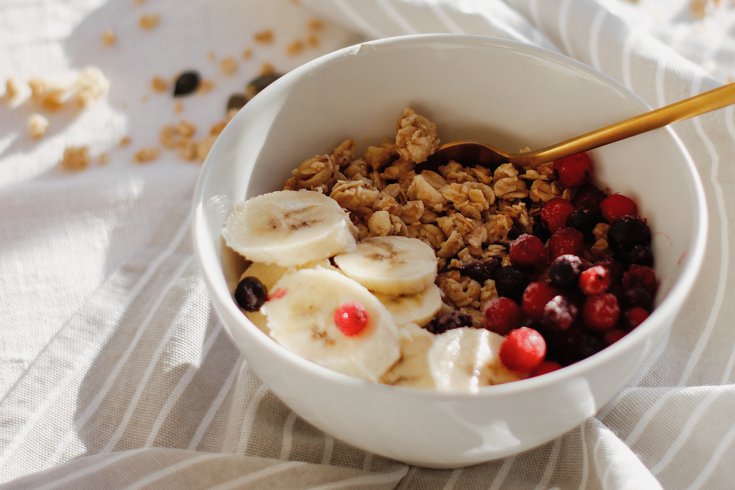
December 06, 2022
 Nati Melnychuk/Unsplash
Nati Melnychuk/Unsplash
To overcome morning sleepiness, a new study suggests people eat a breakfast of complex carbohydrates, like oatmeal and fresh fruit.
Who hasn't needed a shot of espresso to get themselves going in the morning? Many of people struggle with morning grogginess and rely on caffeine to keep them alert throughout the day. Scientists, however, say there are healthier ways to eliminate fatigue than a cup of coffee.
When people feel overtired in the morning, they are lingering in the state of sleep inertia – the transition from sleep to wakefulness, according to sleep experts.
Sleep inertia is a circadian process that regulates memory, mood, reaction time and alertness upon waking. When people are in a heightened state of sleep inertia, they may feel groggy and prefer to fall back asleep. They also may experience impaired thinking and decision-making, which can affect work and school performance, and increase the risk of accidents and injuries.
For most people, sleep inertia usually only lasts 15 minutes to a hour, but it can persist for hours for some people, significantly affecting the quality of their lives. Various factors can contribute to a heightened sleep inertia, including a sedentary lifestyle, anxiety, depression, inconsistent sleep, dehydration, a poor sleep environment, sleep disorders and fatigue caused by a medical condition.
One recent study identified three key actions that help people start the morning alert and feeling refreshed. They include eating a breakfast rich in complex carbohydrates, like a bowl of steel-cut oatmeal with fresh fruit, and forgoing sugary cereal and large, sugar-laden coffees.
"We found that when you have a spike in your blood glucose after breakfast, you're going to feel less alert, you're going to feel more sleepy after that breakfast," Raphael Vallat, a postdoctoral fellow at University of California, Berkeley's Center for Human Sleep Science, told U.S. News & World Report. "You want to avoid foods that will drastically increase your blood glucose."
Foods that provide a slower release of carbohydrates and a more manageable blood sugar response are associated with the best wake-up, the data shows. Other slow-release, complex carbs include sweet potatoes, brown rice and quinoa. The researchers found that a high-protein breakfast, such as protein shake, makes people feel more groggy – not less.
The researchers also found that getting more physical activity than usual on the preceding day, and sleeping a bit longer than usual, help people avoid morning fatigue.
Still, outside experts pointed out that it might not be practical for people to get more than their usual amounts of sleep and exercise every day, but that on days when people need to be at their best, these recommendations may be helpful.
The study's three recommendations were based on data collected from 833 people who wore activity trackers over a two-week period. The researchers tracked their exercise levels and sleeping patterns, and gave them a variety of prepared breakfasts to determine the role various nutrients might play.
The study was conducted in the real world as opposed to a sleep lab, like many other sleep studies.
Other strategies to combat morning sleepiness include:
• Strategic napping. According to Healthline, daytime naps lasting no longer than 20 minutes can help people stay more alert. Longer naps only make it harder to fall asleep at night.
• Light and temperature. The Sleep Foundation says that both light and temperature in the bedroom can affect the quality of sleep. Adjust the temperature in the bedroom so that it is more comfortable, and turn off all electronics and lights. Artificial light can disrupt the body's natural circadian rhythm.
• Gentle waking. The sound of an alarm clock in the morning can be jarring, so instead use a smart clock, which can sense when a person is in a light state of sleep, or a sunrise alarm clock, which slowly wakes people by increasing light and gentle sounds.
• Stay hydrated. Dehydration decreases alertness and increases sleepiness and fatigue. The Institute of Medicine recommends women consume 2.7 liters, or 91 ounces, of fluids daily. Men should drink 3.7 liters, or 125 ounces.
• Practice a healthy lifestyle. Eating a healthy diet and exercising every day promotes good sleep health.
People who are struggling with extreme grogginess in the morning are advised to get evaluated by a doctor to rule out any underlying medical conditions.